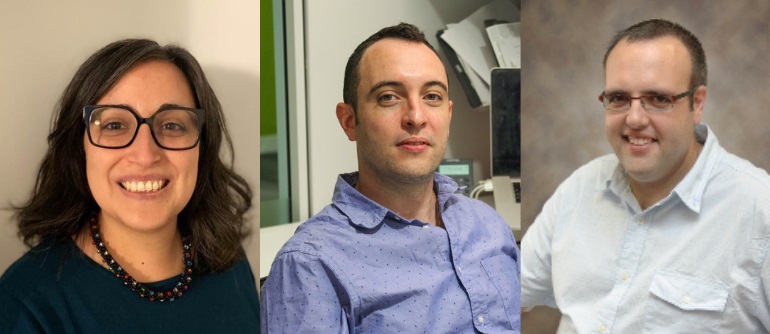
The National Institutes of Health has awarded a trio of researchers from Wayne State University’s School of Medicine and College of Liberal Arts and Sciences a five-year, $2.2 million grant to expand a project launched eight years ago in metropolitan Detroit investigating how family lifestyle and environment can exacerbate genetic pre-disposal to asthma.
Professor of Molecular Medicine and Genetics Francesca Luca, Ph.D.; Assistant Professor of Psychology and of Family Medicine and Public Health Sciences Samuele Zilioli, Ph.D.; and Associate Professor of Molecular Medicine and Genetics Roger Pique-Regi, Ph.D., are the principal investigators of “Psychosocial and Genetic Effects on Gene Expression and Asthma,” a project launched in March with support from the National Heart, Lung and Blood Institute of the NIH.
The NHLBI supported the study, Asthma in the Lives Of Families Today, or ALOFT, in two previous grants as well. A total of 297 children were recruited for the initial ALOFT studies. The researchers plan to recruit 200 new families with two children per family between 10 and 15 years old at the time of recruitment.
Preliminary results from bulk RNA sequencing analysis in peripheral leukocytes demonstrated that psychosocial factors are associated with transcriptional changes for a large number of genes, many of them involved in immunological functions.
“Importantly, we and others have uncovered an important role for blood cell type composition in inter-individual variation in response to psychosocial environments and their effects on immunological health and asthma symptoms,” Dr. Luca said.
Results from the initial studies of the cohort, “Psychosocial experiences modulate asthma-associated genes through gene-environment,” are published in eLife, an open access online platform.
“With this new grant in particular, we are trying to disentangle the genetic and environmental components by studying siblings where only one of them has asthma and the other is healthy. We are also focusing on individual cell types within blood, rather than looking at all cell types together,” Dr. Luca added.
Specifically, they will use the grant to disentangle the contribution of psychosocial factors and asthmatic state on patterns of transcriptional dysregulation; investigate the effects of psychosocial factors on transcriptional regulation in blood cell type subpopulations; and determine the role of genetic variation in modulating these effects and their consequences for asthmatic children’s health.
The team plans to use a combination of bulk and single cell RNA sequencing on immune cells collected from children with asthma and their asymptomatic siblings. “The complementary expertise of our team will uncover specific genetic and psychosocial factors associated with increased risk for poor physical health and well-being,” Dr. Luca said.
The results could guide personalized medical and behavioral interventions to alleviate disease severity in children with asthma.
“I do not think there are a lot of people doing social genomics at this level of detail among African American youth with asthma,” he said. “Asthma is one of the costliest pediatric health problems. Impoverished cities in the United States, including Detroit, suffer a disproportionate burden of asthma morbidity and mortality.”
The grant number for this National Institutes of Health study is 1R01HL162574-01.